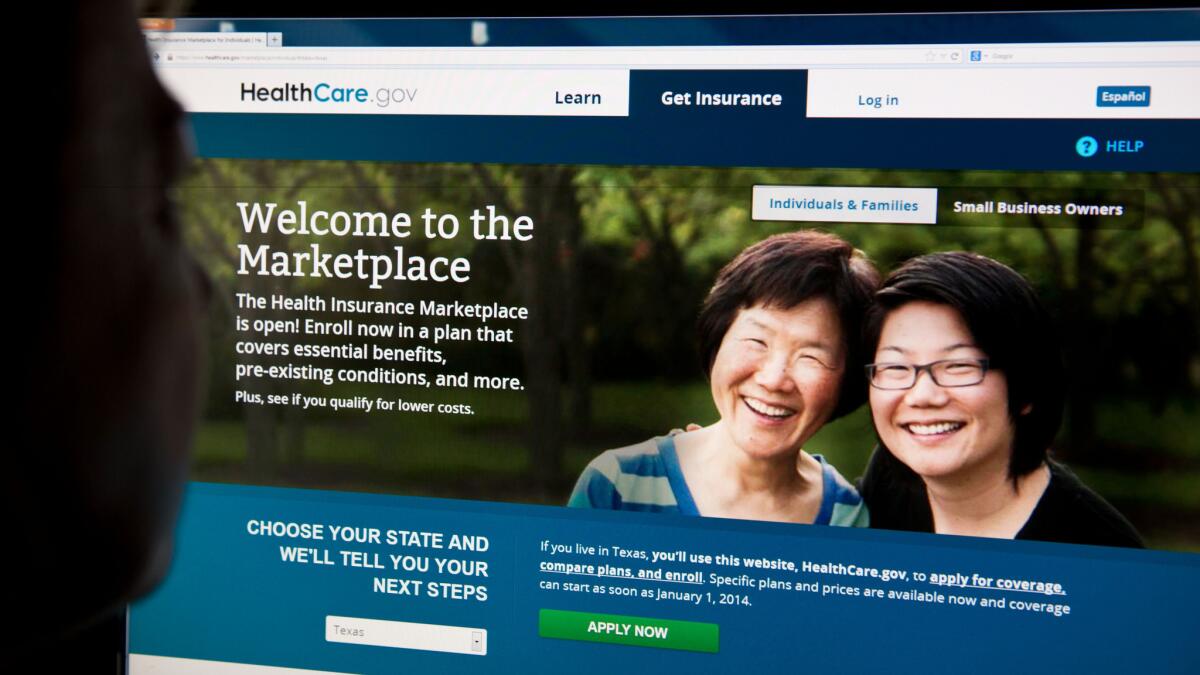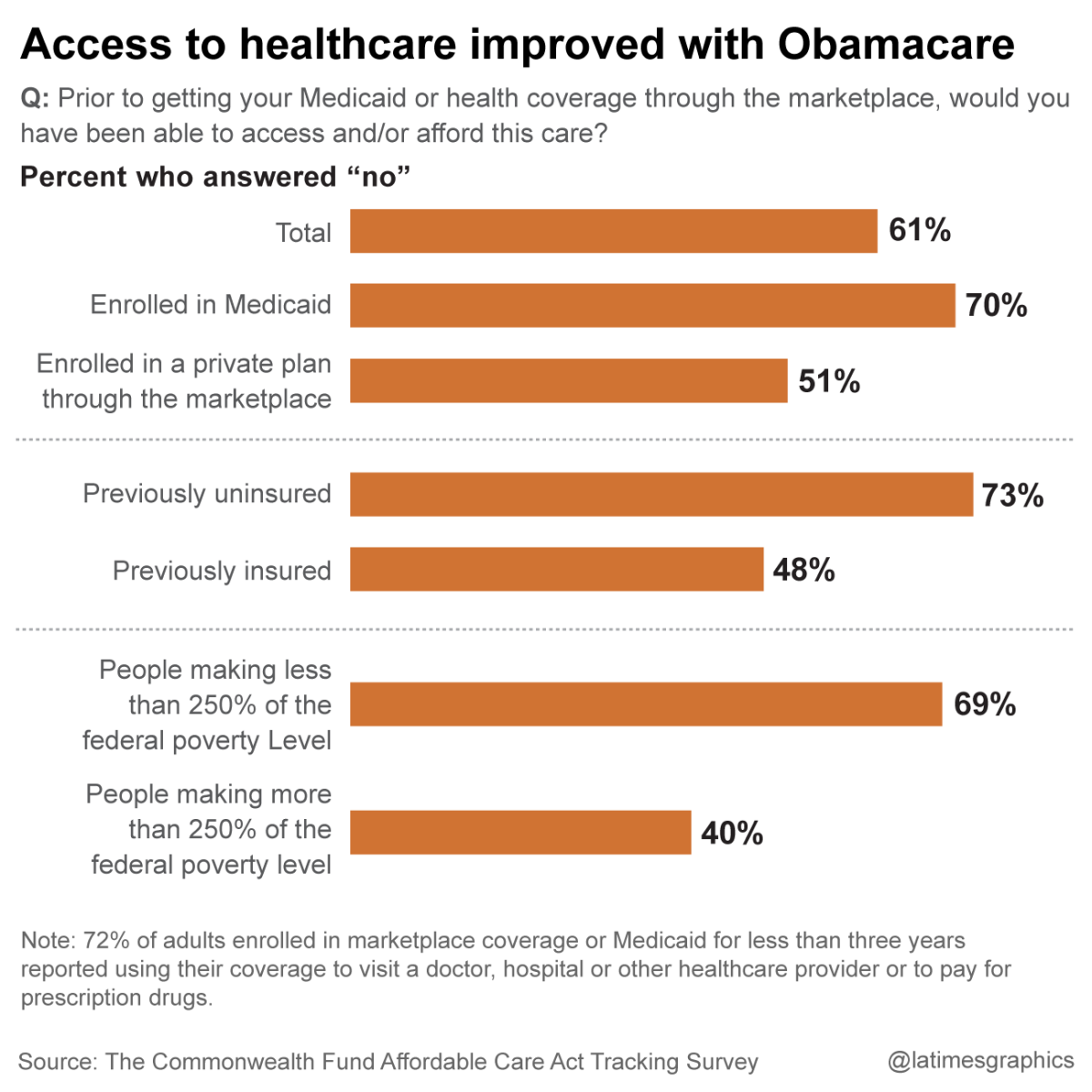Obamacare is helping millions get needed healthcare, new survey finds

More than 60% of working-age Americans who signed up for Medicaid or a private health plan through the Affordable Care Act are getting healthcare they couldn’t previously get, a new nationwide survey indicates.
And consumers are broadly satisfied with the new coverage, despite some cost challenges and an ongoing Republican campaign to discredit the law.
Overall, 82% of American adults enrolled in private or government coverage through the health law said they were “somewhat” or “very” satisfied, according to the report from the nonprofit Commonwealth Fund.
“If the fundamental purpose of health insurance is to provide people with adequate access to needed healthcare, then it would seem that, on balance, the Affordable Care Act’s coverage expansions are working well for most of the people who have enrolled in them,” the report concluded.
NEWSLETTER: Get essential California headlines delivered daily >>
The findings paralleled a recent nationwide survey by the nonprofit Kaiser Family Foundation, which found that two-thirds of people in a marketplace plan created through the law rated their coverage “excellent” or “good.”
Unlike the new report, the Kaiser survey did not include people newly enrolled in Medicaid through the law, which is often called Obamacare.
New Medicaid enrollees are even happier with their health coverage than Americans in commercial health plans purchased through the marketplaces, with 88% reporting they are somewhat or very satisfied, the Commonwealth Fund found.
Americans with employer-provided health plans – which have lower premiums and deductibles than many marketplace plans – are the happiest, with 90% reporting satisfaction with their coverage.
The high marks are not universal, cautioned fund Vice President Sara Collins, the report’s lead author.

Indeed, some consumers who had coverage before the health law was implemented have seen their premiums and deductibles increase as insurers have absorbed millions of new consumers, many of whom could not obtain health insurance previously because they had a pre-existing medical condition.
The Commonwealth Fund, like Kaiser, has found that many Americans are concerned about the cost of their healthcare.
Nearly half of consumers in marketplace plans reported difficulty paying premiums in 2015. The fund plans to update those findings with 2016 numbers later this year.
“This [report] doesn’t mean that the law is working well for every single person,” Collins said. “But in general, it seems to be enabling people to get the healthcare that they need.”
More than eight in 10 people said their ability to get needed care has either improved or stayed the same since they enrolled in coverage through the health law.
The law allows Americans who don't get health benefits at work to shop among plans on state-based exchanges operated by the federal government or by the states themselves.
Consumers making less than four times the federal poverty level — about $47,000 for a single adult or $97,000 for a family of four — qualify for subsidies. Insurers must provide a basic set of benefits and cannot turn away consumers, even if they are sick.
Very low-income Americans in most states can enroll in the government's Medicaid program at virtually no cost, an option provided by the health law that leaders in 31 states and the District of Columbia have elected to make available to their residents.
The dual coverage expansions have led to the largest drop in the nation’s uninsured rate in at least half a century, surveys show.
The new Commonwealth Fund survey found that 45% of adults enrolled in a marketplace plan in 2016 and 62% of adults newly covered by Medicaid were previously uninsured.
More state leaders are now considering Medicaid expansions, including in very conservative states such as Oklahoma.
And enrollment in the marketplaces has been increasing, albeit at a slower rate than initially forecast; there are about 12 million people in marketplace plans.
But the law remains a political hot button, with Republican congressional leaders and presumptive GOP presidential nominee Donald Trump promising full repeal.
At the same time, many insurers are seeking significant premium increases next year, in part because enrollees in marketplace plans are sicker and more expensive than they anticipated.
The Commonwealth Fund survey was conducted between Feb. 2 and April 5 among a random, nationally representative sample of 4,802 adults ages 19 to 64. It has a margin of error of plus or minus 2 percentage points.
See the most-read stories this hour >>
ALSO
Two L.A. councilmen want you to vote for $1-billion measure to house the homeless
Did a billionaire Silicon Valley investor fund Hulk Hogan's lawsuit against Gawker?
Why Obama's overtime rule may barely dent the economy
Twitter: @noamlevey
Sign up for Essential California
The most important California stories and recommendations in your inbox every morning.
You may occasionally receive promotional content from the Los Angeles Times.








